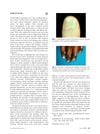 January 2021 in “Our Dermatology Online”
January 2021 in “Our Dermatology Online” Oral tofacitinib successfully treated total body hair loss in one patient.
55 citations,
October 2019 in “The journal of allergy and clinical immunology/Journal of allergy and clinical immunology/The journal of allergy and clinical immunology” The review suggests that other immune cells besides CD8+ T cells may contribute to alopecia areata and that targeting regulatory cell defects could improve treatment.
 January 2024 in “Journal der Deutschen Dermatologischen Gesellschaft”
January 2024 in “Journal der Deutschen Dermatologischen Gesellschaft” Non-biologic immunosuppressive drugs are crucial for treating autoimmune and chronic inflammatory skin diseases.
[object Object]  December 2022 in “Dermatology and Therapy”
December 2022 in “Dermatology and Therapy” Alopecia areata needs more recognition and better treatment access in Latin America to improve patient care and outcomes.
 35 citations,
January 2020 in “Skin Pharmacology and Physiology”
35 citations,
January 2020 in “Skin Pharmacology and Physiology” The review concluded that keeping the hair-growing ability of human dermal papilla cells is key for hair development and growth.
 13 citations,
April 2022 in “Anais brasileiros de dermatologia/Anais Brasileiros de Dermatologia”
13 citations,
April 2022 in “Anais brasileiros de dermatologia/Anais Brasileiros de Dermatologia” The document concludes that more research is needed to find effective treatments for Lichen planopilaris and Frontal fibrosing alopecia.
 3 citations,
December 2022 in “Cells”
3 citations,
December 2022 in “Cells” Cannabinoids like CBD and THC may help treat non-cancer skin diseases, but more research is needed.
1 citations,
August 2023 in “Biomolecules” Certain immune-related proteins are higher in people with alopecia and their healthy relatives, hinting at a genetic link.
 1 citations,
April 2023 in “Science Advances”
1 citations,
April 2023 in “Science Advances” High levels of ERK activity are key for tissue regeneration in spiny mice, and activating ERK can potentially redirect scar-forming healing towards regenerative healing in mammals.
 April 2024 in “Bioactive materials”
April 2024 in “Bioactive materials” New microneedle treatment with growth factors and a hair loss drug shows better and faster hair growth results than current treatments.
 January 2017 in “Journal of Investigative Dermatology Symposium Proceedings”
January 2017 in “Journal of Investigative Dermatology Symposium Proceedings” The 2015 Hair Research Congress concluded that stem cells, maraviroc, and simvastatin could potentially treat Alopecia Areata, topical minoxidil, finasteride, and steroids could treat Frontal Fibrosing Alopecia, and PTGDR2 antagonists could also treat alopecia. They also found that low-level light therapy could help with hair loss, a robotic device could assist in hair extraction, and nutrition could aid hair growth. They suggested that Alopecia Areata is an inflammatory disorder, not a single disease, indicating a need for personalized treatments.
 December 2024 in “Journal of Cosmetic Dermatology”
December 2024 in “Journal of Cosmetic Dermatology” Exosomes from platelet-rich plasma may help heal wounds but need more research for hair growth and skin use.
November 2022 in “Regenerative Therapy” Advancements in tissue engineering show promise for hair follicle regeneration to treat hair loss.
 September 2023 in “British Journal of Dermatology”
September 2023 in “British Journal of Dermatology” Hair regrowth from severe alopecia areata treatment with baricitinib can vary, with faster results in those with shorter hair loss duration.
[object Object] September 2021 in “Journal of the Dermatology Nurses' Association” The convention discussed various skin conditions, treatments, and the importance of continuous learning in dermatology nursing.
 December 2022 in “Rossijskij žurnal kožnyh i veneričeskih boleznej”
December 2022 in “Rossijskij žurnal kožnyh i veneričeskih boleznej” New treatments for child hair loss due to immune issues are effective but not yet officially approved.
 56 citations,
January 2019 in “Lancet”
56 citations,
January 2019 in “Lancet” JAK inhibitors help regrow hair in alopecia areata patients, improving their quality of life.
 April 2018 in “Journal of Investigative Dermatology”
April 2018 in “Journal of Investigative Dermatology” Blocking a specific immune cell signal can trigger hair growth.
138 citations,
March 2021 in “Journal of the American Academy of Dermatology” Ritlecitinib and brepocitinib effectively regrow hair in alopecia areata patients.
 24 citations,
October 2018 in “JAAD Case Reports”
24 citations,
October 2018 in “JAAD Case Reports” A woman's eyelash regrowth was successful using tofacitinib solution for alopecia areata.
July 2021 in “Journal of dermatology & dermatologic surgery” IMTA can help regrow hair in severe alopecia areata when JAK inhibitors don't work well.
 2 citations,
June 2018 in “Journal of the American Academy of Dermatology”
2 citations,
June 2018 in “Journal of the American Academy of Dermatology” Alopecia areata causes varying hair loss and nail changes, and treatments include topical, systemic, and injectable therapies.
 4 citations,
January 2023 in “The journal of allergy and clinical immunology/Journal of allergy and clinical immunology/The journal of allergy and clinical immunology”
4 citations,
January 2023 in “The journal of allergy and clinical immunology/Journal of allergy and clinical immunology/The journal of allergy and clinical immunology” Biologics, especially Dupilumab, are effective and safe for treating severe childhood eczema.
 1 citations,
February 2024 in “JEADV. Journal of the European Academy of Dermatology and Venereology/Journal of the European Academy of Dermatology and Venereology”
1 citations,
February 2024 in “JEADV. Journal of the European Academy of Dermatology and Venereology/Journal of the European Academy of Dermatology and Venereology” Baricitinib effectively promotes long-term hair regrowth in alopecia areata patients.
 20 citations,
March 2023 in “American Journal of Clinical Dermatology”
20 citations,
March 2023 in “American Journal of Clinical Dermatology” Baricitinib improved severe hair loss in adults over 52 weeks and was safe to use.
 July 2023 in “JAAD International”
July 2023 in “JAAD International” Two drugs, finasteride and minoxidil, are approved for hair loss treatment, but new therapies are being developed.
 1 citations,
July 2019 in “Clinical Rheumatology”
1 citations,
July 2019 in “Clinical Rheumatology” Leflunomide is more likely to help treat alopecia areata than cause it.
 April 2021 in “Sohag Medical Journal”
April 2021 in “Sohag Medical Journal” Alopecia areata is an autoimmune condition causing hair loss, linked to genetic factors and immune system issues, with no cure yet.
 1 citations,
April 2018 in “Journal of Investigative Dermatology”
1 citations,
April 2018 in “Journal of Investigative Dermatology” PRC1 is essential for proper skin development and stem cell formation by controlling gene activity.
 September 2022 in “Intisasi sains media”
September 2022 in “Intisasi sains media” A young child with complete hair loss improved significantly with a combination of hair growth treatments and laser therapy.
























